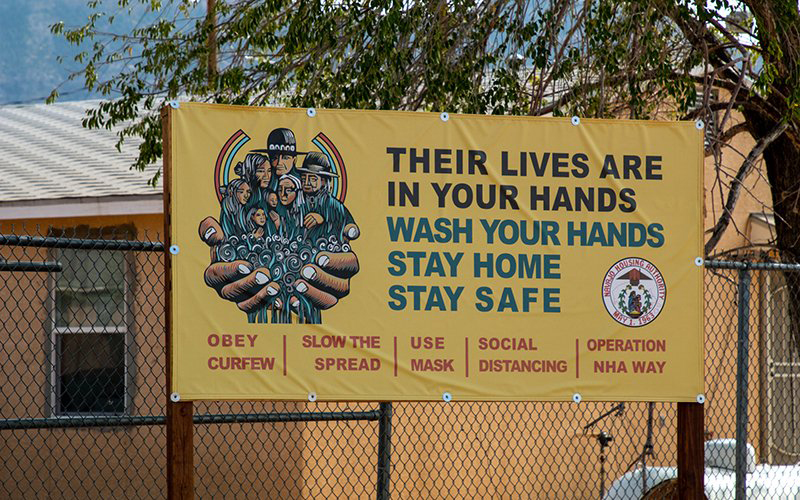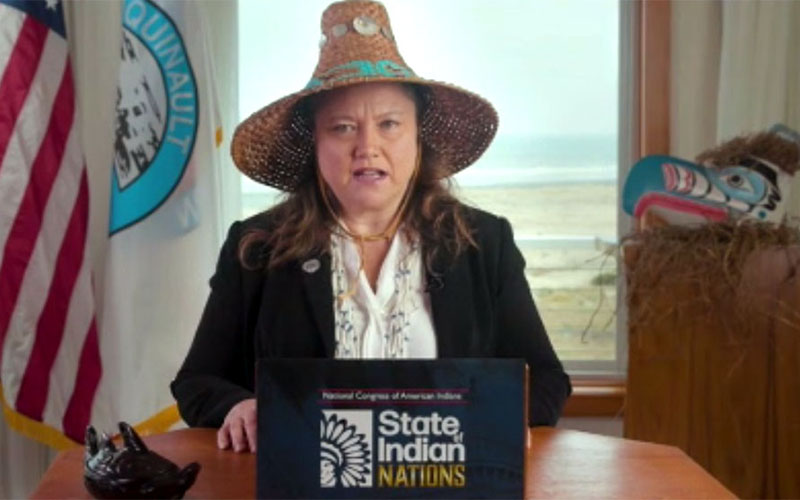WASHINGTON — Tribes in Oklahoma are both hopeful and anxious as they wait for the funds and spending rules from the American Rescue Plan that President Joe Biden signed last week.
Native American tribes nationwide will receive more than $31 billion as part of the American Rescue Plan, the largest one-time investment to Native American communities in history. However, the amount of money set to be given to Oklahoma tribes on an individual basis is largely unknown and likely will be until further tribal consultation has occurred.
Nonetheless, some tribes in Oklahoma hope the plan will pull them out of the fight against COVID-19 and return to normal.
“I think (spending will) be less (focused) on the PPE and testing and (more focused on) the economy (being) decimated and making things kind of get back to somewhat of a new normal,” said James Weigant, COVID Task Force coordinator for the Osage Nation. “But at the same time, you’re hearing rumors of a fourth wave in Europe, and you know, the other shoe could drop, and we’re back into the trenches again.”
Out of the $31 billion tribes will receive, $20 billion will focus on combating COVID-19 and stabilizing safety nets in tribal communities. Additionally, $1 billion will be split evenly among the 574 federally recognized tribes, portioning about $1.7 million to each tribe, including the 38 federally recognized tribes in Oklahoma, said Libby Washburn, special assistant to Biden. The remaining $19 billion will be distributed to each tribe using an undisclosed formula developed by the U.S. Treasury.
Another portion of that money is from Housing and Urban Development, in which Oklahoma tribes will receive about $65 million under the Indian Housing Block Grant program, Washburn said.
Under a separate program from HUD — the Indian Community Development Block Grant program — there is a $280 million pot from which tribes nationwide can seek grants. Housing infrastructure has been an ongoing issue for many tribes in Oklahoma throughout the pandemic, and Washburn expects Oklahoma tribes to take advantage of these programs.
The Osage Nation, like other tribes, is developing an early and broad spending plan that remains difficult to finalize without further guidance from the federal government, but they’re focusing on key areas, one of them being infrastructure.
“We’re trying to identify some of those areas,” Weigant said. “It’s still a draft and work in progress … but infrastructure is a big part of that.”
U.S. Rep. Tom Cole, R-Oklahoma, a Chickasaw Nation citizen who voted against the COVID-19 relief package, sent a statement to Gaylord News regarding the investment into tribal nations.
“While I disagreed with many provisions unrelated to the pandemic contained in the legislation signed into law by President Biden, I am glad that additional resources will be made available to support the pandemic response of tribal nations. This includes additional funds for vaccine-related activities, virus mitigation efforts and mental health services,” Cole said. “As home to 39 tribal nations, Oklahoma’s tribes will certainly put its future allocation of these funds to good use. Indeed, the investment will benefit the health and well-being of both tribal members and surrounding communities.”
Despite the amount of money set to be sent to Native American communities, Ben Barnes, chief of the Shawnee Tribe, has concerns about the distribution process.
The tribe received the minimum $100,000 from the CARES Act in March 2020, owing to a stipulation within the distribution formula that mistakenly accounted that the Shawnee Tribe had a population of zero. Several other tribes faced similar issues regarding the census, including the Choctaw Nation, the Delaware Tribe of Indians in Oklahoma, and others nationwide.
As a result of this uncorrected error, the Shawnee Tribe, which reported a population of 3,021 to the U.S. Treasury, was effectively denied up to $12 million in the CARES Act. The tribe filed suit against the Treasury, and Shawnee Tribe v. Mnuchin is ongoing.
“My concern with the American Rescue Plan is they’re going to try and come up with some weird formula. And they’re not going to use a tribe’s actual number of citizens for the distribution,” Barnes said.
In a statement to Gaylord News, Cherokee Nation Principal Chief Chuck Hoskin Jr. also voiced concern about the needs of his tribe, including mental health services, Indigenous language preservation, domestic violence, substance abuse services as well as broadband infrastructure, sanitation infrastructure and much more.
“Tribes are unique in terms of the American Rescue Plan in that distribution of the funds will be based in part on tribal consultation, and there are strict timelines that federal agencies must adhere to in order to ensure timely distribution of funds,” Hoskin said. “Based on our experience with the CARES Act funds, we are concerned about possible onerous, restrictive agency guidelines that could impede on our ability to serve our citizens and communities. We’ve asked the Biden Administration to allow for flexibility in use of the funds and defer to tribal nation decision-making given we are in the best position to know the needs of our communities.”
The Biden administration released a memorandum during the president’s first week in office stating that they will “(make) respect for tribal sovereignty and self-governance, commitment to fulfilling federal trust and treaty responsibilities to tribal nations,” as well as stating “regular, meaningful and robust consultation with tribal nations” is a “priority.” Tribes remain hopeful the Biden administration’s commitment to Native American communities will shine through in the American Rescue Plan and help put COVID-19 behind them.
“(Native Americans) were hit among the hardest in the entire country,” Washburn said. “This is really helping them build back to where they were and get on a stronger footing for the future.”
Gaylord News reporter Libbey Dean contributed to this article. Gaylord News is a reporting project of the University of Oklahoma Gaylord College of Journalism and Mass Communication. Cronkite News has partnered with OU to expand coverage of Indigenous communities.

